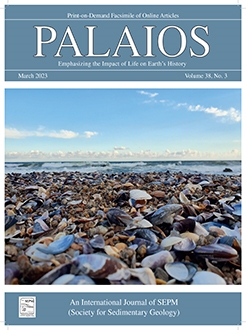Microbially induced sedimentary structures (MISS) are abundant in Ediacaran and lower Cambrian successions. However, the relationship between MISS distribution and facies has not been thoroughly explored in Ediacaran–Cambrian successions in South America. This study documents the occurrence of MISS and other potential biogenic structures from the late Ediacaran Serra de Santa Helena Formation in the Bambuí Group of eastern Brazil. This unit overlies the Cloudina-bearing Sete Lagoas Formation and is a mixed carbonate-siliciclastic succession devoid of macroscopic body fossils. Potential microbial structures include wrinkled structures such as “elephant-skin” and Kinneyia-like textures, as well as pustular structures and abundant positive epirelief discoidal structures. Another putative biogenic structure is a mm-wide meandering groove resembling a simple locomotion trail of a small vagile benthic metazoan. Microbial surface textures (i.e., “elephant skin” and Kinneyia-type wrinkles) were mainly observed in heterolithic deposits, usually at the interface between sandstone and siltstone/shale. On the other hand, discs show a facies-independent distribution, observed in heterolithic as well as carbonate and marl deposits. Petrographic analyses of these discs suggest that they have complex origins and some of them may be diagenetic structures. Thus, while facies may have strongly controlled the preservation of MISS-related structures and textures in the Serra de Santa Helena Formation, their abundance and diversity in tidal flat deposits indicate the wide distribution of matgrounds in these shallow marine paleoenvironments. Also, we demonstrate how detailed description and classification of simple features, such as discoidal structures, is an important task for paleoenvironmental reconstruction of marine ecosystems at the Ediacaran–Cambrian transition when the microbially bounded substrates played important roles in the dynamics of coastal environments.
How to translate text using browser tools
3 May 2023
SIMPLE STRUCTURES AND COMPLEX STORIES: POTENTIAL MICROBIALLY INDUCED SEDIMENTARY STRUCTURES IN THE EDIACARAN SERRA DE SANTA HELENA FORMATION, BAMBUÍ GROUP, EASTERN BRAZIL
Juliana Okubo,
Lucas Inglez,
Gabriel J. Uhlein,
Lucas V. Warren,
Shuhai Xiao
ACCESS THE FULL ARTICLE
It is not available for individual sale.
This article is only available to subscribers.
It is not available for individual sale.
It is not available for individual sale.

PALAIOS
Vol. 38 • No. 4
April 2023
Vol. 38 • No. 4
April 2023




